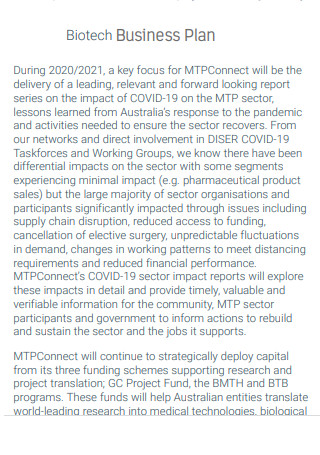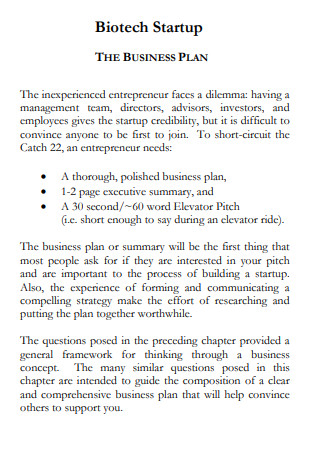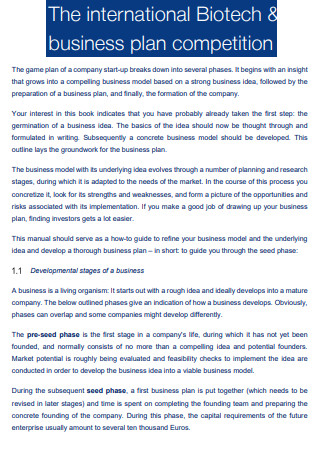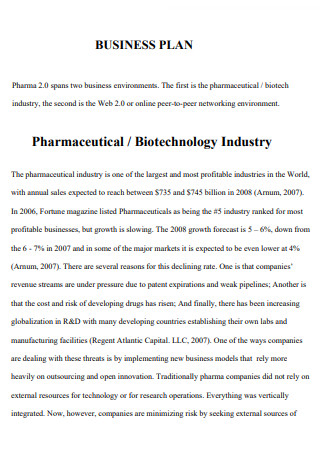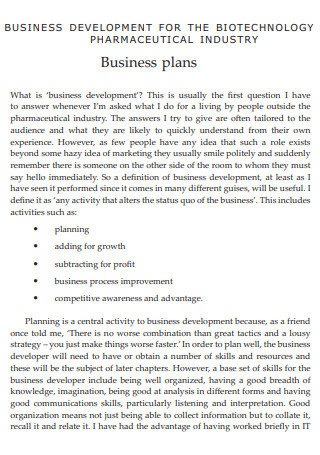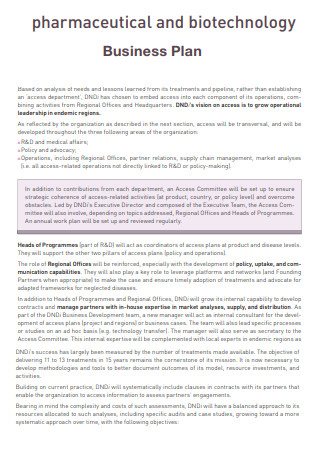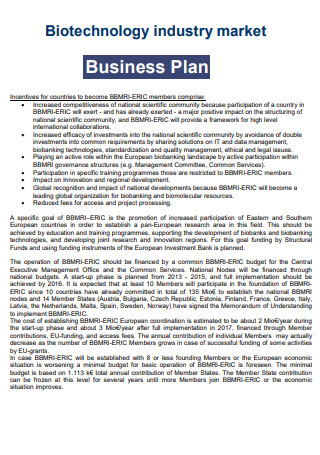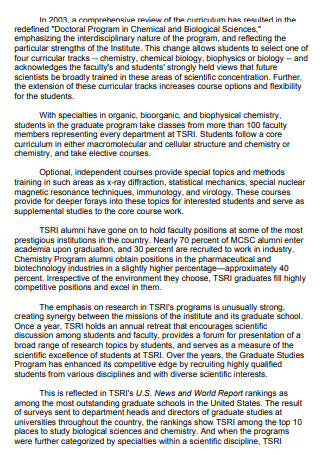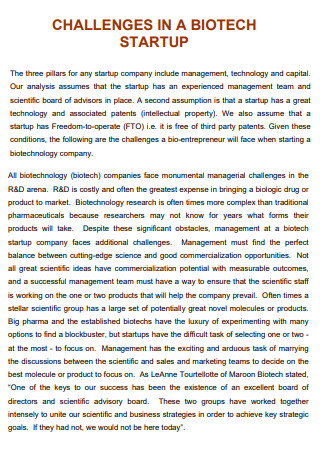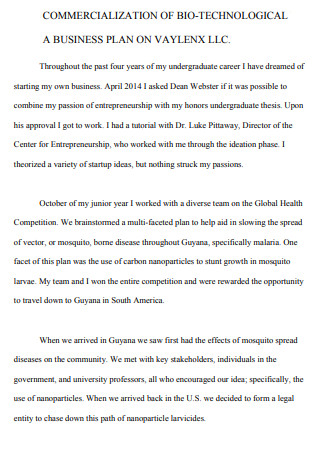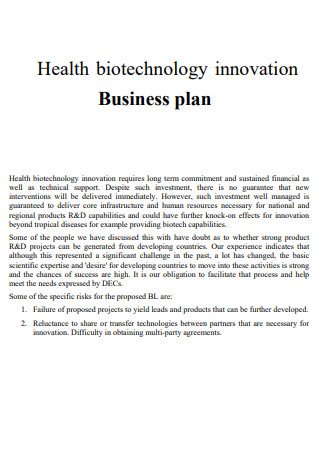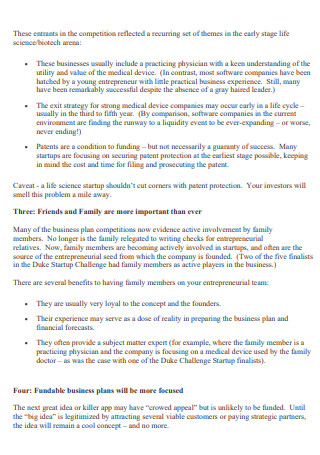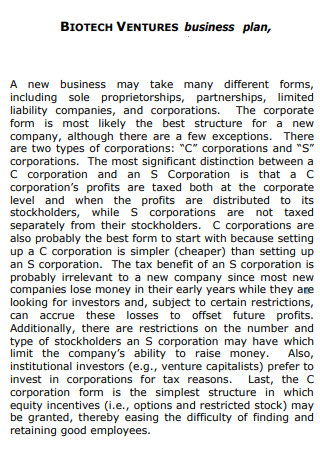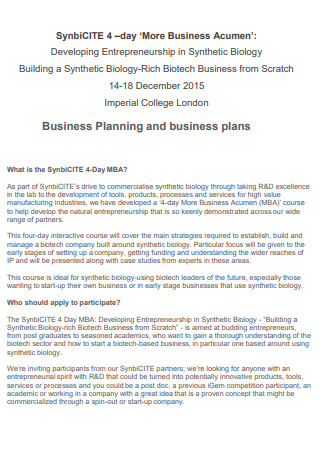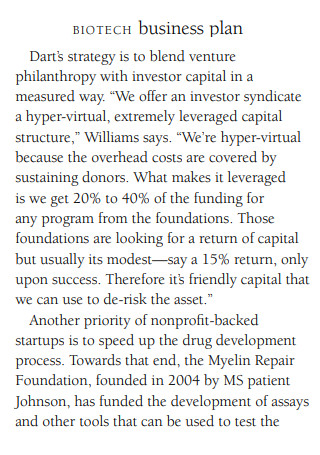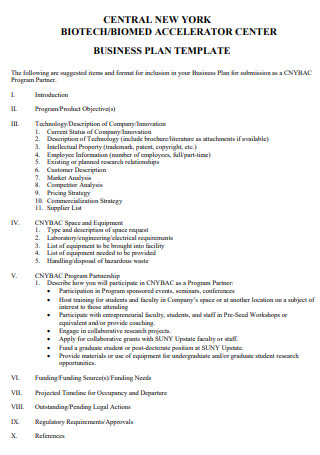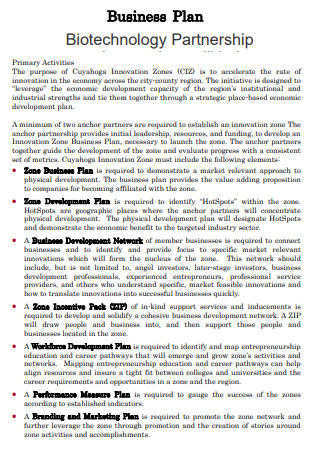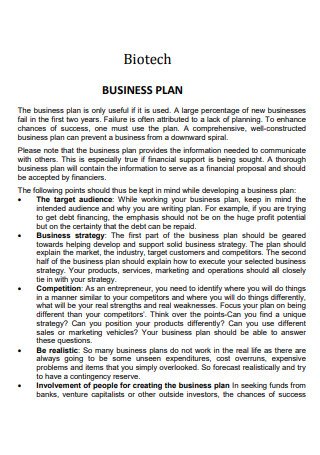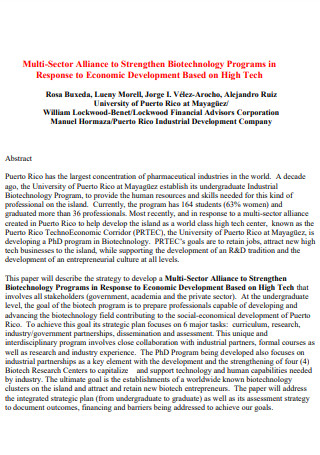19+ SAMPLE Biotech Business Plan
FREE Biotech Business Plan s to Download
What Is a Biotech Business Plan?
A biotech business plan demonstrates how biotechnology can be used to create commercial products. And these items cater to a sector of biotech that can help humans in a variety of ways. As an example, consider how biotechnology can aid in disease prevention or the development of a vaccine. Profit can be made by creating a business plan for these novel drugs or products. The market, financial projections, and growth are all highlighted in the business plan. As well as simplifying how its science can be accomplished.
Branches of Biotechnology
Now, there are various branches of biotechnology. It is no longer restricted to food genetic engineering. Many industries gain from it as well. If we want to aid the world and start going green, one option is to use biotechnology. The utilization of biotech products is an excellent environmental action plan. Even though it necessitates many researchers and investigations, the outcomes are often worthwhile. So, before we get into the benefits, let’s go over the different types of biotechnology.
Medicine: Some medical projects use biotechnology to create new pharmaceutical items. Alternatively, product diagnostics. They create those goods using living cells and cell materials. And it’s all with the purpose of bettering how diseases are treated or cured. Or even how to better identify and detect them. It also aids in the manufacturing and supply of less expensive but more effective medications. Because it simply has to use an existing genetic source to produce large quantities. Biotechnology knowledge is also useful in medical projects and studies. By understanding its own genetic makeup, it can assist lower the prevalence of an infectious disease. It can assist in tailoring treatments based on the risks and adverse effects that they may bring to a certain individual. Overall, it aids in the fight against serious illness and the advancement of treatments all around the world. Food: In 1994, the first genetically modified organism (GMO) was commercially marketed. However, genetic engineering on food has been studied and experimented with for years and decades before that. And its purpose is to generate crops that have the same nutritional content but can change color or speed of production. All of this is good news for suppliers. Alternatively, for any agricultural projects. However, safety and health must not be jeopardized. As a result, although genetically modifying some cells in those goods, they must not be harmful for human consumption. Biotechnology contributes to the food industry by allowing plants to be bred more quickly and efficiently. Rather of the traditional method of cross-breeding, genetic engineering is a better choice. It is significantly faster and saves a lot of time. And in agriculture, keeping up with the demand and wants of its population is better news and a better solution. Environment: One strategy to improve the environment is to increase food security through biotechnology. There are various processes that aid in the effective and clean decomposition of garbage. Rather than dumping them in a landfill or incinerator. Which is a common waste management plan. We must pursue a far greener and safer method of permanently disposing and getting rid of garbage. Our earth is suffering because of everything we choose to neglect to live in a more advanced and modern society. But, in the end, we’ll have to deal with the repercussions one way or another. Biotechnology can also aid in the development and research of bioplastics. Plastics that can hold a heavy load but degrade faster than non-biodegradable plastics that take hundreds of years to breakdown. Biofuels are also available, which generate energy from natural resources or agricultural waste. Rather than using petroleum, which is extremely toxic and contributes significantly to air pollution. There is also animal farm cultivation, which contributes significantly to pollution. Biotechnology can help in this regard by developing alternatives for meat sources that do not include the use of an actual animal. However, simply acquiring and utilizing a sample and growing the flesh in the lab. Industry: The use of biotechnology aids in the industrial industry’s sustainability. It is possible to achieve this through providing eco-efficient and eco-friendly tools and products. By creating an environmentally friendly product, you are assisting Mother Nature as well as the product’s long-term viability. Limitations, however, must be exercised with caution, as they may result in the extinction of a given natural resource. The purpose of industrial biotechnology is to help reduce the quantity of pollution released into the environment. It might either address the root cause of the problem by providing alternatives and solutions, or it could address the manifestation of the problem. Or simply opening new markets without negatively impacting the environment. Industries can employ biotech as a catalyst to accelerate the adoption of innovative technology. Clean technology is promoted by an invention that replaces polluting materials with non-polluting products made from developed enzymes. Human: All the biotech branches described above make their unique contributions to improving people’s lives. It simplifies and reduces the cost of diagnostic and prognostic testing. It has the potential to alleviate food scarcity without harming the environment or causing significant damage. We may face less reaction from Mother Earth if we provide environmentally friendly alternatives. We could genetically modify food that could generate more while still being safe. And all of this contributes to humans thriving in the direction of a greener option. And here is when a biotech business plan pdf comes in handy. What it can provide folks in need of assistance. It has the potential to reduce hunger and disease. We can help defend ourselves by using vaccines, which is a biotechnology.
Benefits of Biotech
Biotechnology has the potential to be a weapon in the hands of individuals with malicious intentions. It can, however, be used and applied for the greater benefit. People should contribute to biotech research and development. It has the potential to alter our way of life and lifestyle. We are given the opportunity to use it to make the world a better place. Biotech research reports are not deceptive. There are indeed potential and existing benefits to be discovered. And here’s a list of them.
Medical Advancement: When it comes to disease prevention, biotech has proven time and again to be beneficial. Medical experts and researchers can now better comprehend diseases. It is possible to do so by researching the genetic component of a virus or bacteria. Since we can comprehend them better, we would be able to create a better treatment. Experts have learned a lot about the causes of birth abnormalities by researching the human genome. Direct modification of a human or organism gene via biotechnology may even hold the answer to prolonging human lifespan. In addition, gene therapy can heal hereditary diseases. It entails correcting faulty genetic material using gene engineering. And it’s all excellent news for people who were born with deformities. However, genetic engineering technology is far from robust. However, that option already provides us with an advantage that we cannot obtain elsewhere. Preserve Resources: Healthy foods are in short supply in various places of the world. Not just nutrient-depleted consumables. And the people who reside in these locations are malnourished and have a poor diet. However, biotechnology has enabled us to preserve food in ways that it won’t go bad. This permits it to last for a long time while still attempting to keep its nutritious content. And all of this is fantastic news for folks who are facing a food scarcity. We have learned how to preserve our foods by drying and freezing them. Furthermore, heating it would aid in the removal of hazardous substances. Create Vaccines: Vaccines have always aided in the faster eradication of viruses. Or, in other ways, slow the rate of infection. People who work from home have become infected with COVID 19. And if it hadn’t been for the immunizations, its mortality rate would have hit new highs. Biotechnology aids in the development of vaccines. It enables us to investigate how infections and transmissions occur. It aids in the creation of a net in which we might choose to protect ourselves from transmission. Or, at the very least, restrict how it can be transmitted. Those who are vulnerable are also given the choice to defend themselves. The genetic component of the virus is being studied to have a better understanding of how it evolves. And who it affects and how it spreads are already well-known facts. Vaccines have also enabled us to protect ourselves from potentially fatal infections. Nonetheless, its protection lifespan should be observed. Minimize or Eliminate Waste: Waste products are a thorn in the side of our environment. And it’s a thorn that we, as humans, have imposed on ourselves. Natural waste decomposes and degrades much faster. This is because they are a part of the natural cycle. Nature had figured out how to degrade and respond to these wastes. Non-biodegradable items, on the other hand, cannot make the same claim. However, biotechnology has discovered ways to use bioplastics. Products with a higher biodegradability rating. We won’t have to wait hundreds of years for these wastes to decay naturally. It also aids in the reduction of land contamination. Most notably, plastics in the ocean destroy the sea creatures that live there. Increase Food Sources: The most impressive aspect of biotechnology is its adaptability. How it can produce crops in places where they would typically not grow. For example, being able to raise a healthy and edible crop in the desert. That is already a ground-breaking idea. It’s only a matter of time before biotechnology accomplishes this. We have limited area on which to cultivate food, and this is becoming progressively more limited as modern structures take over society. It’s critical to understand that we have more feasible solutions.
How To Make a Biotech Business Plan
The biotech industry is unquestionably valuable. But it’s still a business, as it always been. However, this venture will necessitate additional financial resources. There is a lot of money invested in research and studies. As a result, the biotech business plan sample mentioned above is helpful. Or simply, learn how to make one.
-
Step 1. Write an Overview
A quick explanation of your company’s overview should be provided. Provide a powerful introductory paragraph that highlights your primary goals. Describe the long-term ambitions and objectives of the company. Draw your readers’ attention by emphasizing crucial points. Most importantly, entice your investors by presenting a revenue strategy and financial estimates.
-
Step 2. Identify Target Market and Competition
The market is something that should always be identified in any business. Individuals or organizations to whom your product will be marketed. Make it as enticing as possible. There are just a few sectors in biotechnology that will be specifically catered to. Determine the target market for your idea. It would also be tempting to investors if they were aware of how profitable the market is. Investigate potential clients to determine the size of your market. As well as the demographic that your product can impact. Simultaneously, research your competitors. Understand their strengths and weaknesses, just as you do your own. As a result, you will be able to appeal to your target demographic more readily and effectively than they will.
-
Step 3. Make Financial Projections
Financial projections are pitches to a business plan for investors. Making a financial projection entail researching your market, competitors, and the value of your own product. It is not only facts and figures that must be considered, but also prospective repercussions and reactions. And by emphasizing how your biotech product has the potential to be the best. It’s best to provide a strong and nearly exact estimate.
-
Step 4. Employ Strategies
There are several marketing, finance, production, and growth methodological approaches that can be used. In business, it’s always better to think positively about the future. Determine the major areas where expansion is potential. Especially in financial terms. By detailing your profit-increasing plan.
-
Step 5. Explain the Science
The science is actively involved in the promotion of your goods. It must not only be viable, but it must also be accessible. The science must exist or have a solid foundation. Young entrepreneurs in the startup biotech industry are continually looking for innovative ideas. However, novelty may not always imply scientific feasibility. Simplify the jargon in your product’s scientific section if possible. Specifically, the method of its creation and the applications of biotechnology.
FAQs
Is it Expensive to Launch a Biotech Startup?
Yes. Biotechnology is an expensive endeavor. It will cost millions to billions of dollars in capital. This is due to the significant scientific research and experimentation required. Some may necessitate repeated tests and trials. And the materials used aren’t exactly cheap. And, in certain cases, it can take years before it is made available to the public. Given such considerations, it is possible that it will be costly.
How Does Biotechnology Benefit the Environment?
Biotechnology benefits the environment by developing products that are easily degradable. Or things that can aid in the elimination of waste. Certain enzymes aid in the rapid breakdown of big molecules into smaller fragments. In other words, it hastens its dissolution. Biotechnology can also help us become more environmentally friendly when it comes to food.
What are the Different Types of Biotech?
Human, medicine, the environment, food, and industry are all branches of biotechnology.
There is still a long way to go in biotechnology. Yes, it might be an expensive enterprise, but the products it produces aid in the survival of humanity. It can be beneficial in the medical, food, and environmental sectors. And you can take one step forward by getting the biotech business plan template and biotech business plan pdf!
